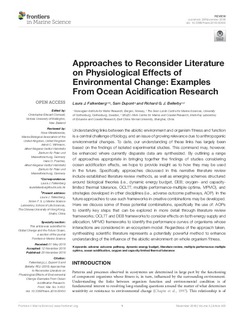Approaches to Reconsider Literature on Physiological Effects of Environmental Change: Examples From Ocean Acidification Research
Journal article, Peer reviewed
Published version

View/
Date
2018Metadata
Show full item recordCollections
- Publikasjoner fra Cristin - NIVA [2160]
- Scientific publications [1172]
Abstract
Understanding links between the abiotic environment and organism fitness and function is a central challenge of biology, and an issue of growing relevance due to anthropogenic environmental changes. To date, our understanding of these links has largely been based on the findings of isolated experimental studies. This command may, however, be enhanced where currently disparate data are synthesized. By outlining a range of approaches appropriate in bringing together the findings of studies considering ocean acidification effects, we hope to provide insight as to how they may be used in the future. Specifically, approaches discussed in this narrative literature review include established literature review methods, as well as emerging schemes structured around biological theories (i.e., dynamic energy budget, DEB; oxygen- and capacity-limited thermal tolerance, OCLTT; multiple performance-multiple optima, MPMO), and strategies developed in other disciplines (i.e., adverse outcome pathways, AOP). In the future approaches to use such frameworks in creative combinations may be developed. Here we discuss some of these potential combinations, specifically the use of: AOPs to identify key steps that can be explored in more detail through literature review frameworks; OCLTT and DEB frameworks to consider effects on both energy supply and allocation; MPMO frameworks to identify the performance curves of organisms whose interactions are considered in an ecosystem model. Regardless of the approach taken, synthesizing scientific literature represents a potentially powerful method to enhance understanding of the influence of the abiotic environment on whole organism fitness.
